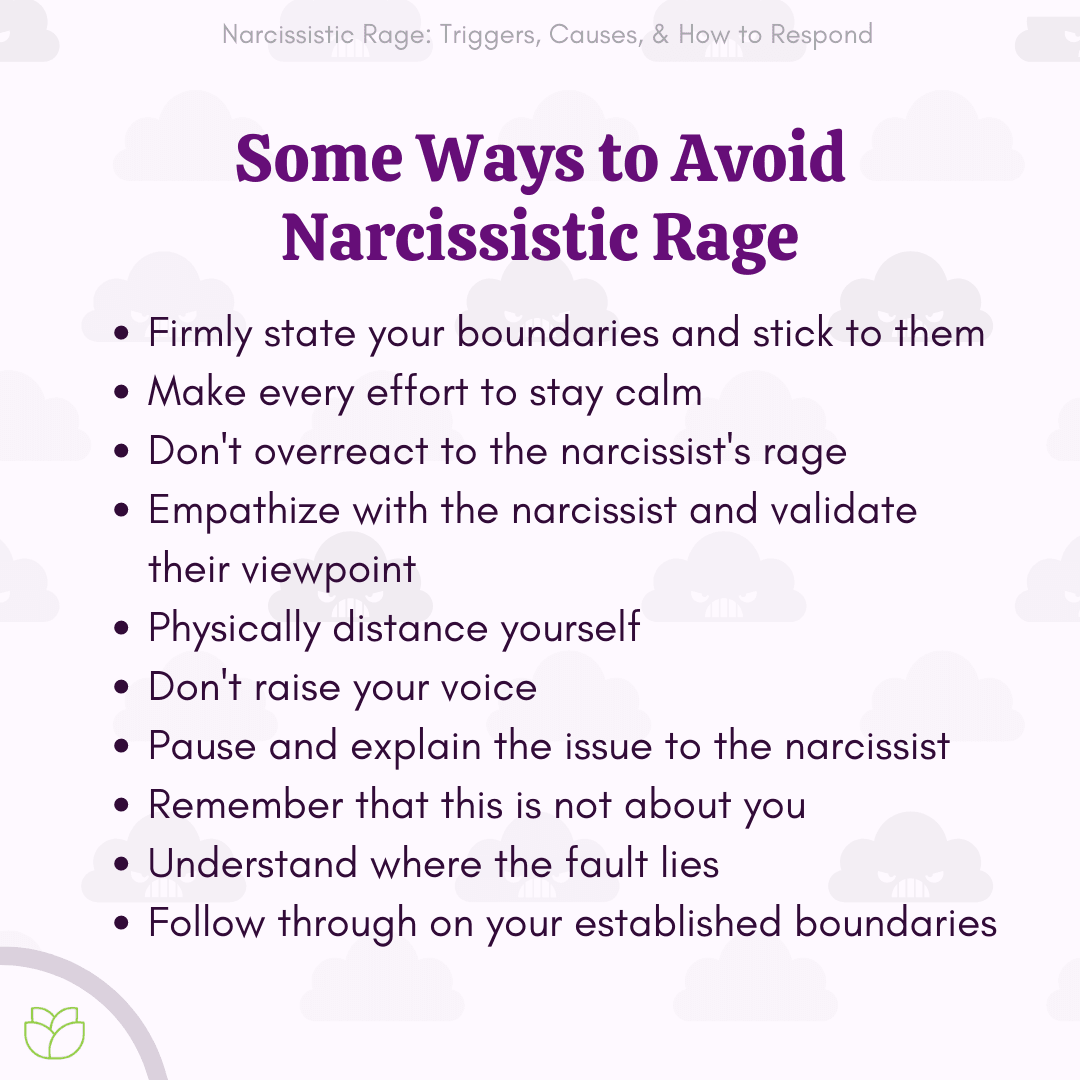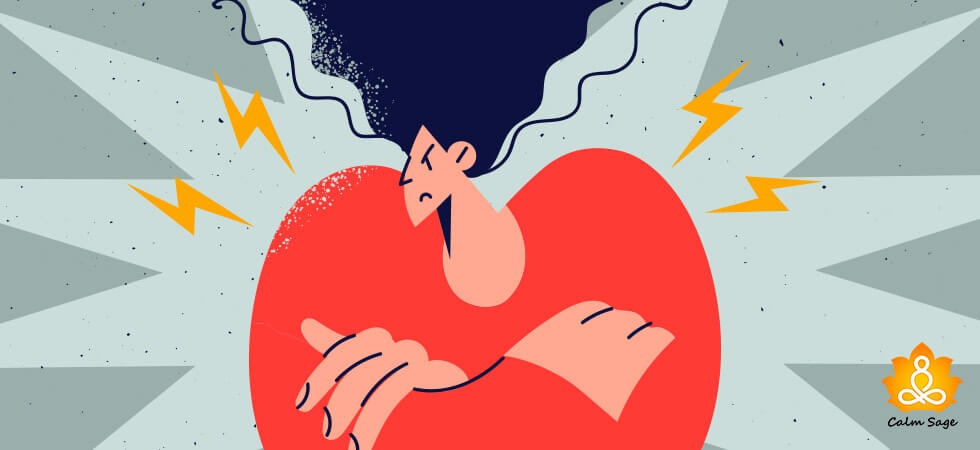What Is Narcissistic Rage? Signs, Examples, And How To Respond

First coined by Heinz Kohut, an author, in the 1970s, narcissistic rage refers to outbursts of intense anger by people with narcissistic personality disorder (NPD). Narcissistic personality disorder (NPD) is when someone has an unrealistic sense of self-importance.
An individual with NPD wants others to offer admiration to them and when others fail to do so, it can trigger feelings of shame that can bring about anger and rage. A person with NPD might lash out at others without caring how their actions impact others.
People with NPD also have a sense of insecurity and they are unable to take criticism. When their sense of self is questioned or threatened, they may react with extreme emotions. Rage and anger are only one of them but they are often the most common ones.
In this blog, you’ll learn what narcissistic rage is, its signs, examples, triggers, and how to respond to the rage when you’re struggling with it and when your loved ones are.
What Is Narcissistic Rage?
Admiration is something we all want from others, but, if we don’t get it, we move on. However, people with NPD might respond with rage when they don’t get attention. This rage can be in the form of yelling, selective silence, and passive-aggressive brush-off.
Narcissistic rage occurs when a negative remark or criticism is made towards the narcissist. This kind of response can cause them distress and rage is a reaction that’s activated as a defense mechanism. The rage can range from verbal abuse to violent physical attacks, depending on the intensity.
Keep in mind that not all aggressive actions or angry outbursts are narcissistic rage-related. All of us get angry from time to time, and it does not necessarily mean that we’re struggling with a personality disorder.
Signs Of Narcissistic Rage:
Narcissistic rage can have outward and inward signs that you need to look for. Here are some narcissistic rage symptoms:
Outward Signs
- Angry outbursts when not given attention
- Screaming and shouting
- Extreme rage
- Sudden bouts of anger
- Verbally or physically aggressive
- Intentionally hurting others – emotionally, physically, or otherwise
Inward Signs
- Being passive-aggressive
- Silent treatment/sulking
- Withdrawing from others
- Avoiding others
- Being overly sarcastic
- Being indignant
- Having a sense of entitlement
- Being bitter towards others
- Disassociation
Narcissistic Rage Cycle
-
The Spark
The narcissistic rage cycle starts with a spark. Something happens that doesn’t go the narcissist’s way or threatens their ego. It could be something as small as a disagreement or not getting enough attention.
-
Anger
After the spark, comes anger. Not just any kind of anger, but the kind of rage where it feels like a volcano erupting. This is the narcissistic rage we are talking about in this article.
-
Repetition
Instead of calming down, the narcissist will stay angry and then, the rage comes back. The anger they feel and experience will come back again and again, without any signs of it cooling down.
What Causes Narcissistic Rage?
Narcissistic rage is a component of narcissistic personality disorder and while we can’t say for sure what causes NPD, we can say that this disorder can be caused by a mix of genetics, upbringing, and past experiences.
Narcissistic personality disorder can be overt, covert, or high-functioning and can affect almost every aspect of a person’s life.
Here are some factors that can contribute to NPD or narcissistic rage:
- Childhood neglect, abuse, trauma, or lack of emotional validation
- Having a highly sensitive temperament
- A lack of emotion regulation skills
- A lack or instability of self-esteem
- Facing setbacks that can affect self-image
Keep in mind that in the case of narcissistic rage, the progression of rage is sudden and child-like. It can go from feeling stressed to an angry outburst in a few minutes, unlike typical rage progression.
What Makes A Narcissist Angry?
Here are some narcissistic rage examples to help you understand:
1. Not Getting Attention
When a person with NPD does not get the attention they think they deserve from people around them, then they might get jealous and either lash out in rage or sulk until they are given the attention.
2. Reaction To Criticism
People with narcissistic personality disorder have an unstable sense of self-esteem which can make them angry and explode with rage if they are criticized (even constructive criticism)
3. Things Not Going Their Way
When someone with NPD gives you an unreasonable task to do and if you refuse to do it, they might lash out at you because things are not going the way they want.
4. Feeling They’ve Lost Control
People with NPD like to exert control over people and situations so when they feel that they are losing their control over others, they are more likely to respond in anger.
What Can Be The Impact Of Narcissistic Rage?
Narcissistic rage can have negative effects on the person with NPD and also on others around them. Here are some examples of what kind of impact narcissistic rage can have:
- Disagreements in a relationship
- Breakups/divorce of a relationship
- Others not wanting to be around
- Financial troubles
- Losing friendships
- Problems holding jobs
- Problems attending school
- Physical harm (to others as violence; to self with self-harm)
- Feeling worthless or guilty
- Depression
- Substance abuse
- Addiction
- Suicidal thoughts
Note: If you’re afraid that your loved one with NPD might hurt themselves or others, then immediately call your nearest emergency services. You can also call National Domestic Violence Hotline (USA) or National Commission for Women Helpline (India).
How to Control Your Narcissistic Rage?
1. Spot the Signs
The first step is to see the signs of narcissistic rage. The heart is racing, fists clenched, jaw tight, etc. When you notice these signs, then take a deep breath and ask yourself what’s the reason for your anger.
2. Take a Timeout
When your narcissistic rage bubbles, take a break. Step away from the situation and go for a walk. You can also count to ten and give yourself a chance to cool down, before you say or do something that you’ll regret later on.
3. Reflect
It’s time to reflect on your feelings. Ask yourself why you’re this upset. Is it because you feel threatened or a loss of control? Knowing why you feel the way you do can help you address the cause and not blindly react in rage.
4. Manage Stress Positively
Find ways you can manage your stress and frustrations with positivity. You could try exercising, talking to a friend, or practicing some mindfulness techniques. Having these tools can help you handle stress and tough situations without getting overwhelmed and angry.
Responding To Narcissistic Rage

If you’re struggling with controlling narcissistic rage, then you can seek professional help. Therapy can help you better understand your behavior, address the causes, figure out the triggers, and form healthy coping strategies.
If you’re dealing with the narcissistic rage of others, then here are some ways to help you respond to narcissistic rage:
1. Understand more about narcissistic personality disorder, its symptoms, causes, etc. this will help you get familiar with some common triggers.
2. Avoid criticizing people with NPD to avoid triggering an angry outburst.
3. If you’re stuck in a conflict, avoid fueling it more. Avoid taking things personally. Sometimes the person with NPD might not even know that they are hurting you with their comments.
4. Try not to become angry at yourself. In case the other person is angry, you remain calm and collected to avoid escalating the situation.
5. If you can, walk away from the situation and remember that it’s not your responsibility to stay and argue with the other person.
6. To protect yourself from their rage and actions, set boundaries and tell them what kind of behavior is acceptable and what’s not.
7. If your loved one with NPD is angry, then take a step back, give them time to calm down before picking up the conversation.
8. If you feel that you’re in immediate danger of getting physically hurt, immediately contact your nearest helpline number or emergency services for assistance.
Writer’s Thoughts
If you’re struggling with narcissistic rage or if your loved one is, then the best thing you can do is understand what is narcissistic rage, its signs, and triggers. If you feel that the outbursts (self or from others) are affecting your daily life, then you can reach out to a professional and get help.
Remember, narcissistic rage not only affects people with NPD but also people near and dear to them. With a proper diagnosis and the right treatment, you can live a happy and healthy life.
If you have any queries, you can reach out to us at info@calmsage.com or DM us on social media. I hope this article helped you understand what narcissistic rage is and how you can deal with an angry narcissist.
Found this article helpful? Let us know in the comments below.
Take Care!




















